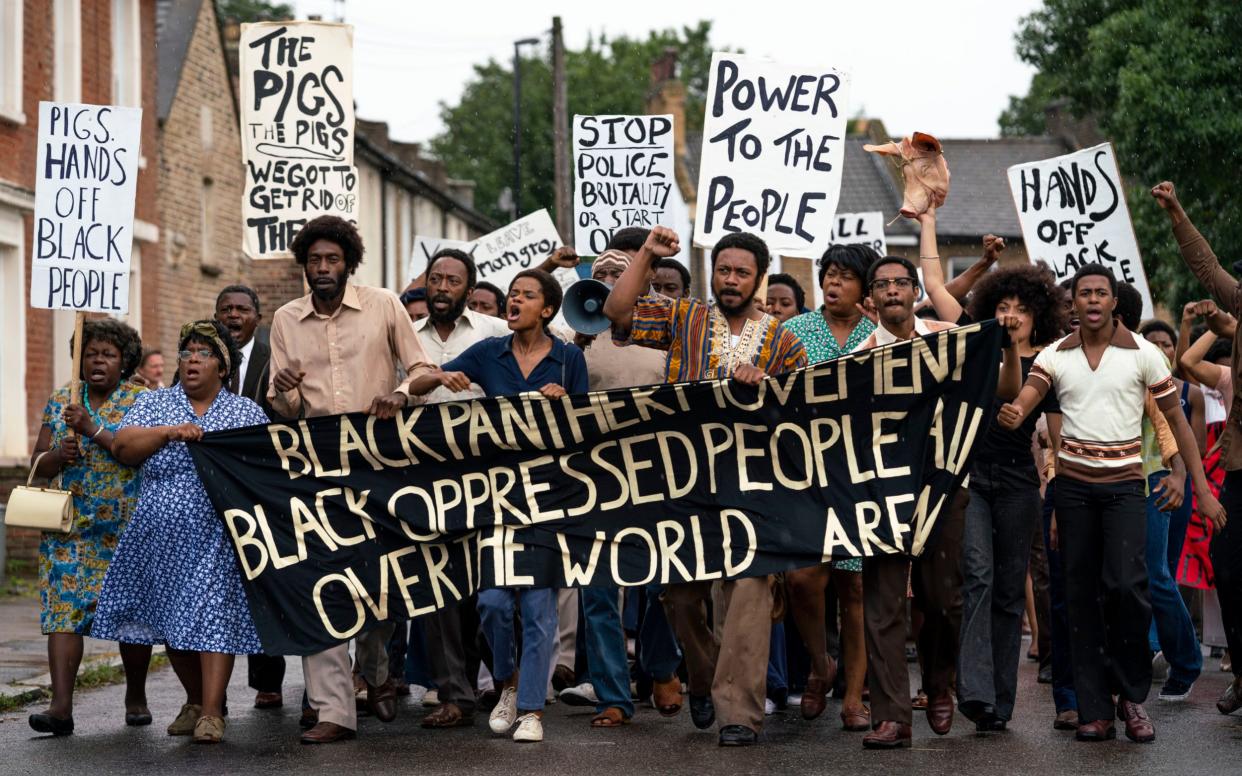Mangrove review, London Film Festival: Steve McQueen makes history with a soul-rattling true story of racial injustice

Dir: Steve McQueen; Starring: Shaun Parkes, Letitia Wright, Malachi Kirby, Rochenda Sandall, Gershwin Eustache Jnr, Gary Beadle, Jack Lowden, Alex Jennings, Sam Spruell. Cert tbc, 126 min.
“Great men make history,” the Trinidadian historian CLR James once wrote, “but only such history as it is possible for them to make.” At the start of Mangrove, the fantastically gripping and galvanising new film from Steve McQueen, Frank Crichlow (Shaun Parkes) would settle simply for making a living. A first-generation member of London’s West Indian community, Frank is the owner of the Mangrove, a modest restaurant specialising in Caribbean cuisine and something of an impromptu neighbourhood hub.
The place is Notting Hill, though the year is 1968, which means Hugh Grant is nowhere to be seen, and the locals’ doors are less likely to be knocked on by a paparazzi-shy Julia Roberts than a policeman nursing a truncheon and a grudge. Mangrove is the opening gala at the socially distanced and streamable 2020 London Film Festival, which launches this evening (October 7) with a muted premiere at the BFI Southbank. It’s also the first entry in McQueen’s landmark Small Axe project: a collection of five films about 20th-century black British life that will be broadcast next month on BBC One.
Like most of the Small Axe films, Mangrove’s story is a true one, and Frank is its hero – albeit an initially reluctant one. All he wants is to be able to run his restaurant in peace – but this proves impossible when it is repeatedly and violently raided at the instigation of the openly racist PC Pulley (Sam Spruell), even though there are no illegal goings-on to be uncovered. Finding common cause with two young activists, Altheia Jones-Lecointe (Letitia Wright) and Darcus Howe (Malachi Kirby), Frank joins a protest march on the local police station and is arrested and charged with incitement to riot alongside Altheia, Darcus and six others who would become collectively known as the Mangrove Nine.
Their subsequent trial at the Old Bailey feels at first like a stitch-up in the making, yet it slowly and rivetingly transforms into a pivotal moment in the story of UK race relations. Just as they did in real life, both Altheia and Darcus choose to represent themselves – which means that in the most famous court in the land, the black corner is being fought by black voices. McQueen and his co-writer Alastair Siddons carve their tale cleanly in two: an hour-long vivid, enveloping period piece followed by an hour of heart-prickling legal theatre, without a wasted second between the two.

In the Notting Hill scenes, the soundtrack tends towards warm, meandering ska – in one quietly dazzling tracking shot, we watch Frank stroll through the area to the genial strains of Liquidator, by The Harry J All Stars. But in the more threatening surrounds of the Old Bailey, the music comes courtesy of Mica Levi, whose ominous, glissandoing score sounds like a slumbering tiger stretching its limbs. True to the time, Mangrove often feels like an angry-young-man film – and, for that matter, an angry-young-woman one – and features the kind of heartfelt, unvarnished performances that involve relatively little of the capital-A acting the courtroom-drama genre typically demands. That allows McQueen’s big, showpiece moments to connect with his audience all the more directly – such as Parkes’s wounded, Pacino-like brooding when he’s violently thrown into a cell, or the keenly felt emotional undertow of Wright’s speeches.
Perhaps most soul-rattling of all is Kirby’s electrifying closing speech in court, which McQueen stages like a metaphorically loaded historical tableau, with an array of black faces in the public gallery above and a large clock pointedly looming overhead. Yet the film also makes space for some tremendous character turns: not least Spruell’s PC Pulley, whose sheer inscrutability in his vilest moments proves to be one of Mangrove’s most profoundly unsettling manoeuvres. Elsewhere, Jack Lowden has some mischievous fun as a campaigning barrister, as does Llewella Gideon as Aunt Betty, the Mangrove’s headstrong cook – while the clipped establishment tones of Alex Jennings’s trial judge stand in amusing contrast to the various West Indian accents and dialects that ring out around him with increasing frequency as the trial progresses.
Mangrove itself cuts through with all the vibrance and vehemence of a long-unheard voice: McQueen really is making history here, and filling a conspicuous gap in British cinema’s record.
Mangrove will screen later this year on BBC One and BBC iPlayer as part of Small Axe, a collection of five films created by Steve McQueen.


